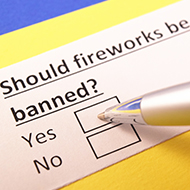
Review follows overwhelming public support for change
A new group which aims to consider current legislation around the use of fireworks in Scotland, has announced its membership.
The Firework Review group – which includes the BVA, the Scottish SPCA, Police Scotland, the Scottish Fire and Rescue Service, the Convention of Scottish Local Authorities (CoSLA), and many other key organisations – has been created following the launch of the Scottish government’s Fireworks Action Plan ‘Promoting the Safe and Appropriate Use of Fireworks in Scotland’.
The action plan outlines a number of planned activities from the Scottish government with the goal of creating tighter restrictions on fireworks and improving firework safety in Scotland. These activities include running awareness campaigns; discussing current and future legislation with the UK Government and supporting publicly organised displays and local communities.
In a public consultation conducted as part of the action plan, 92 per cent of people felt that there should be tighter controls on the use of fireworks, and 93 per cent wanted to see stricter regulations to reduce the unnecessary suffering that animals experience as a result of fireworks.
Planned to be in operation for up to nine months, the group will discuss available options to restrict the use of fireworks on public property and the times at which they can be let off. Presenting its final recommendations to ministers in summer 2020.
Community safety minister Ash Denham, who launched the Fireworks Action Plan, commented: “I am delighted to announce membership of the review group which will now consider how best to use the powers at our disposal to ensure fireworks are used safely and do not cause harm, distress or serious injury.
“The results of both our public consultation and national survey demonstrate overwhelming public support for a change in how fireworks are sold and used, and this group will have a vital role in informing our approach.”



 The Veterinary Medicines Directorate (VMD) is inviting applications from veterinary students to attend a one-week extramural studies (EMS) placement in July 2026.
The Veterinary Medicines Directorate (VMD) is inviting applications from veterinary students to attend a one-week extramural studies (EMS) placement in July 2026.